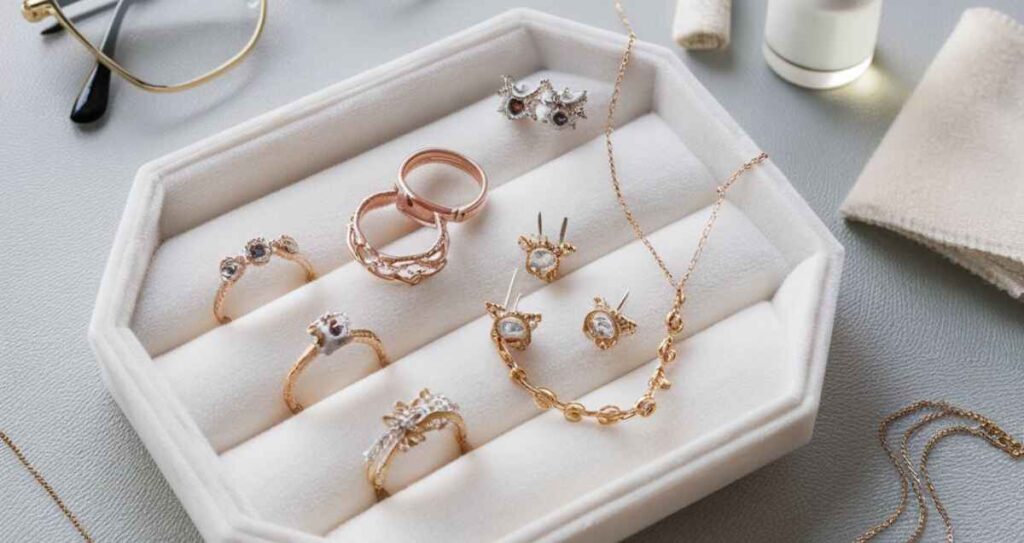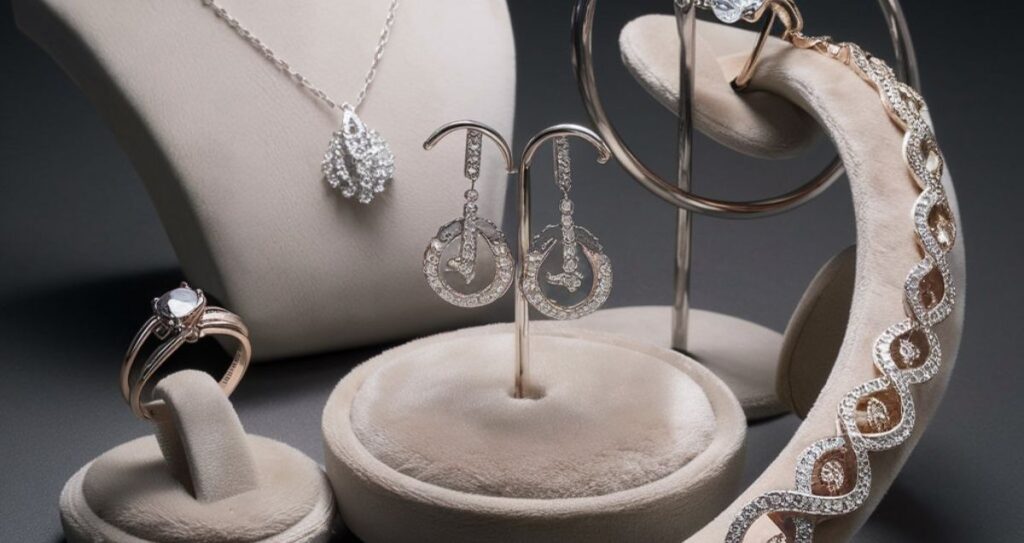Jewelry care refers to the routine cleaning, storage, and maintenance practices needed to preserve the quality and appearance of jewelry pieces.
Want to keep your jewelry shining like new? Learn the best jewelry care tips to protect your favorite pieces from tarnish, scratches, and stone loss!
Proper jewelry care ensures your favorite accessories remain beautiful. Regular cleaning, correct storage, and careful handling can help maintain their shine and value.
Why Jewelry Care is Important

Proper jewelry care is essential to maintain the quality and appearance of your pieces. Over time, exposure to elements like moisture, oils, and air pollutants can tarnish or damage jewelry. Simple habits like improper storage, infrequent cleaning, and wearing your jewelry in the wrong situations can significantly reduce its lifespan. To keep your jewelry looking as good as the day you bought it, it’s crucial to understand the specific needs of each material.
Common Issues with Jewelry Maintenance
- Tarnishing: Common with metals like silver, tarnish occurs when the metal reacts with sulfur compounds in the air, leading to a dull or blackened appearance.
- Scratches: Soft metals like gold and silver can easily get scratched if they’re not stored or handled carefully.
- Stone loss: If settings are not checked regularly, stones like diamonds or sapphires can come loose and may eventually fall out.
- Metal corrosion: Some metals corrode when exposed to moisture or chemicals, weakening their structure over time.
Regular jewelry care not only protects against these common issues but also preserves the emotional and financial value of your collection.
How to Clean Your Jewelry
Different types of jewelry require different cleaning techniques to avoid damage. Using the wrong method can lead to more harm than good. Here’s how to properly clean different kinds of jewelry.
Cleaning Gold Jewelry
Gold, a soft and malleable metal, is relatively easy to clean but needs to be handled with care. Over time, body oils, lotions, and environmental exposure can make gold lose its luster.
Steps for Cleaning Gold Jewelry:
- Fill a bowl with warm water and add a few drops of mild dish soap.
- Soak the gold jewelry for 10-15 minutes.
- Use a soft toothbrush to gently scrub the piece, focusing on any crevices.
- Rinse with clean water and dry with a soft, lint-free cloth.
Pro Tip: Avoid using harsh chemicals like chlorine or bleach, as they can permanently damage gold.
Cleaning Silver Jewelry
Silver is prone to tarnishing, especially when exposed to air and moisture. To restore its shine, follow these steps:
Steps for Cleaning Silver Jewelry:
- Use a silver polishing cloth to gently wipe the surface of the jewelry.
- For heavily tarnished pieces, mix baking soda and water to form a paste. Rub the paste onto the jewelry using a cloth or soft sponge.
- Rinse under warm water and pat dry with a soft towel.
Pro Tip: Store silver jewelry in an airtight bag to prevent tarnish from forming in the first place.
Cleaning Diamond and Gemstone Jewelry
Diamonds and other precious gemstones like rubies, emeralds, and sapphires can get dirty from oils, lotions, and dust, dulling their brilliance.
Steps for Cleaning Diamond Jewelry:
- Mix a solution of warm water and dish soap.
- Use a soft-bristled brush to clean around the stone settings, being careful not to loosen them.
- Rinse the jewelry thoroughly under warm water.
- Dry with a lint-free cloth.
Pro Tip: Have a professional jeweler check your gemstone settings once a year to ensure they are secure.
How to Store Jewelry Properly
Proper storage is a key aspect of jewelry care that often goes overlooked. Jewelry that’s stored carelessly can get tangled, scratched, or tarnished.
Best Practices for Storing Jewelry
- Use separate compartments: Store different types of jewelry in separate compartments or boxes to avoid scratches. For example, gold is softer than silver and can be easily scratched if stored together.
- Keep away from sunlight and moisture: Direct sunlight can fade some gemstones, and moisture can accelerate tarnishing of metals like silver.
- Use anti-tarnish strips: Anti-tarnish strips can help reduce the oxidation process, especially for silver jewelry.
- Avoid tangling necklaces: Lay necklaces flat or use necklace hooks to keep them from tangling.
Pro Tip: For travel, use a dedicated jewelry roll or small zippered pouches to keep your pieces organized and protected.
How to Care for Specific Jewelry Types

Different types of jewelry require specific care routines to maintain their beauty and longevity. Let’s break down the care instructions for the most common types of jewelry.
Caring for Gold Jewelry
Gold is relatively low-maintenance compared to other metals but is still prone to scratches and dents.
- Avoid wearing gold jewelry during strenuous activities like exercise or swimming.
- Remove gold jewelry before applying lotions, perfumes, or cosmetics to prevent buildup on the surface.
- Have gold jewelry professionally polished every few years to restore its shine.
Caring for Silver Jewelry
Silver tarnishes easily but can be restored to its original brilliance with regular care.
- Use a polishing cloth regularly to remove tarnish.
- Avoid contact with harsh chemicals like household cleaners and chlorinated water.
- Store silver in anti-tarnish bags when not in use to reduce exposure to air and moisture.
Caring for Pearls
Pearls are delicate and require gentle care to prevent damage.
- Wipe pearls with a soft, damp cloth after wearing to remove body oils and residue.
- Avoid exposure to hairspray, perfumes, or makeup, as they can damage the pearl’s surface.
- Store pearls in a soft cloth pouch or a dedicated pearl box, not in airtight containers, to allow them to breathe.
Common Jewelry Care Mistakes to Avoid
Taking care of jewelry involves more than just cleaning and storing it properly. Many people unknowingly make mistakes that can damage their pieces. Here are the top mistakes to avoid:
Wearing Jewelry While Swimming
Chlorine in pools and saltwater in oceans can corrode metals and dull gemstones. Always remove your jewelry before swimming.
Over-cleaning
Frequent and abrasive cleaning can wear down the metal and loosen gemstones. Clean your jewelry only when needed.
Using Harsh Chemicals
Products like bleach, ammonia, and alcohol can weaken metal and damage gemstones. Stick to mild soap and water for cleaning.
Professional Jewelry Maintenance: When to See a Jeweler
No matter how diligent you are with your jewelry care routine, some things are best left to the professionals. Here’s when you should consider taking your pieces to a jeweler:
Annual Inspections
Have your jewelry inspected by a professional at least once a year. They’ll check for loose stones, worn settings, or other potential issues before they become major problems.
Deep Cleaning
Professional jewelers have specialized equipment, like ultrasonic cleaners, to remove stubborn dirt and grime from intricate jewelry settings. This is especially useful for complex pieces like engagement rings.
Resizing and Repairs
If your jewelry no longer fits properly or if a piece breaks, don’t attempt to fix it yourself. A professional jeweler can resize rings, fix clasps, and repair damaged settings without risking further damage.
FAQs
How often should I clean my jewelry?
Clean frequently worn pieces, like rings and bracelets, every few weeks. For less frequently worn jewelry, a few times a year should suffice.
Can I wear my jewelry in the shower?
It’s best to avoid wearing jewelry in the shower, as soap and shampoo can leave a residue that dulls the metal and gemstones.
What’s the best way to store fine jewelry?
Store fine jewelry in a fabric-lined jewelry box or in individual cloth pouches to prevent scratching and tangling.
Conclusion
Taking the time to care for your jewelry ensures that your favorite pieces stay beautiful and last a lifetime. From understanding the right cleaning techniques for gold, silver, and gemstones, to knowing how to store your pieces properly, jewelry care is essential to maintaining the beauty and value of your collection.
By following the steps outlined in this guide, you can enjoy your jewelry for years to come—and even pass it down to future generations.
David Mark is a fashion aficionado and writer for Fashion Burst, where he delivers insightful content on the latest trends and style tips. With a keen eye for detail and a passion for all things fashion, David provides readers with expert advice and trend-setting ideas. His engaging posts help you stay ahead of the curve and refine your personal style with confidence and flair.
